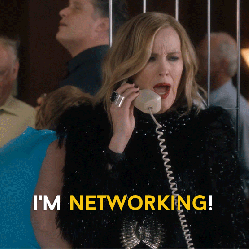Ditch the Pitch: Build Lasting Relationships that Deliver Impact
If there’s one thing remote professionals do a lot of, it’s network. Especially if you are a remote traveler, you are constantly meeting new people and sharing what you do. So the question is: how do you help people understand your business or product in a way that encourages them to more deeply engage? Many people believe the first step is developing an elevator pitch.
If you cringe when you hear the phrase, “elevator pitch,” you’re not alone. Who wants to show up for an event and have a pile of people recite a canned, one-size-fits-all pitch in their general direction before handing you their business card and heading back to the champagne table? Beyond that, who wants to repeat the same pitch over and over again to a bunch of people who showed up for the champagne and probably don’t care anyway? I sure don’t.
The elevator pitch formula - and most forms of “networking” - fundamentally misunderstand how humans operate and connect. You can’t build a meaningful relationship without having an real interaction. This means listening to each other, and speaking purposefully in a way that is tailored to the other person’s needs and worldview. It doesn’t mean preparing and trading 2-minute speeches, exchanging cards, and moving on to the next professional speed date. Not only is this ineffective - it’s alienating. It only takes your needs into account. You’re essentially saying, “Here’s what I do, I hope you want to buy it or refer me or otherwise help me out. I’m not really that interested in you.”
No wonder everyone hates networking.
On the other hand, how many times have you been at an event that wasn’t explicitly about networking, and made a lasting connection? This happens to me all the time when I’m traveling! The difference is that you aren’t in that “networking” mindset, and as a result you enter conversations with the straightforward goal of getting to know someone. So simple. So powerful. So much more effective.
At its best, networking is an opportunity to meet like-minded people and build mutually-beneficial relationships. Approached from this perspective, it can actually be really fun! Instead of turning your “networking brain” on and off according the event type, try developing a mindset in which you are always excited to share your passion for your work with people who are interested and/or might benefit - no matter where you are! I’ve met new clients at parties, dinners, on hikes, and on airplanes - to name just a few places. I wasn’t explicitly pitching my services in any of these situations. I was just showing up as my best, most engaged self - deeply curious about the people around me, and responsive to those who express a mutual interest. This is the common ground on which real relationships are built - the types of relationships in which both parties are connected enough to care about each other’s growth and look for opportunities to facilitate their progress.
Now lets think about how the elevator pitch idea fits into this. The first rule of elevator pitches is generally “keep it short!” This is based on the supposition that you only have a certain amount of time to capture someone’s attention, and if you lose that, you lose your chance. While I agree that it’s important to capture your audience’s attention, I heartily disagree that the best way to do this is with a pre-planned pitch.
In coaching, there is a big focus on learning how to be, “specific, succinct, and generous” in your communication. It’s that last word - generous - that is really lost in the existing elevator pitch paradigm. Generous communication means taking the time to learn about the person you’re speaking to, and then responding in a way they can hear and receive. For example, if you’re speaking to someone who is going through financial struggles, you probably don’t want to brag about all the investors you just landed. If you’re speaking to someone who isn’t in your field, it’s helpful to avoid industry-specific jargon. And if you’re speaking to someone who is genuinely curious about who you are and what you do, don’t hit them with a canned micro-speech.
After all, as Jason Fried (Founder & CEO at Basecamp. Co-author of Getting Real, Remote, and REWORK) says: “...play out some realistic scenarios. When have you ever had to explain your whole business in 20 seconds to someone who was truly motivated to understand what you do? Certainly, there are plenty of times when you are forced to bullet-point your vision to someone who really doesn’t care, like a distant relative or a cab driver. But those who are genuinely curious about your business are willing to listen. It shouldn’t take 10 minutes to explain it, but you don’t need to jam your entire narrative into a couple of quick breaths. The rush of time is a false constraint."
Ok, so how do you make that meaningful connection in a reasonable time frame?
This is something all remote workers (and really every professional) needs to know, and I have some helpful tips for you!
Ask questions and really listen to the answers. First of all, if you’re not actually curious about the person you’re talking to, why are you bothering? Dig in! Learn about them! Ask about their work, their needs, where they are looking for support. Listen to their answers without waiting for your turn to talk. Follow up when you hear excitement in their voice. Discover what fires them up. Pretty much everyone responds favorably to authentic interest. From a brain-based perspective, this also lowers the mental barriers that people put up when they think they are being actively marketed to. (Check out Martin Lindstrom's book Buy-ology for some really fascinating information on the neuroscience front!) Beyond all the practical reasons why this approach will get you in the door, you also get the opportunity to meet a potentially fascinating, like-minded person. Neat!
Start with your “why.” In other words, talk about what your work means to you and to those who benefit from it, not just the nature or title of the job. I don’t necessarily mean put this right at the front of your response to the question, “what do you do?” But I do mean make sure the heart of your answer is centered around your passion and purpose, rather than the logistical details of your job or product. For example, “I believe everyone has the power to create the life and become a person they are proud of. My experience and perspective gives me a unique opportunity to help people figure out how, and nothing makes me happier than seeing them finally living a life they love!” If you strike a chord with your “why,” you’ll get follow-up questions. That’s when you can get into further detail, tailored to the specific person you’re talking to.
Talk about benefits, not features. This is a classic branding and marketing trick. Let me explain the difference with a few examples. Features: “Brain-based coaching leverages neuroscience to facilitate growth and progress. I work with clients to develop goals and strategies, stay accountable to their actions, and build helpful habits.” Benefits: “I use applied neuroscience to help my clients make their brains an asset instead of an obstacle. Together, we work to understand who they want to be and how to get there — uncovering their joyful purpose so they feel better, do better, and make more money.” Do you see the difference? When you talk about features, you are talking about YOU: your job, your product, etc. When you talk about benefits, you are talking about THEM: how your work or product will positively impact their lives. The second approach is more effective by leaps and bounds.
Share your passion. This one is simple: talk about what excites you the most! If you’re passionate and energized about your work, they will be too. No one really wants to engage with people who hate their jobs or don’t believe in their product. (If that’s where you are, you might be a good fit for coaching. Don’t hesitate to schedule a free intro consult if you’d like to learn more!)
Give them a next step. If you’re having a great conversation with a new professional contact, and it’s time to go (or continue mingling), offer them a way to reconnect that’s easy to say yes to. If you really want to make sure the connection is established, (1) take the lead and (2) provide something of value. This establishes a great precedent for generosity in the relationship. Here are a few easy examples:
“I’ve really enjoyed talking to you, and would like to continue the conversation. Maybe I could buy you a coffee and pick your brain more next week, if you’re open to the idea?”
“I have to head out, but I’d love to send you that article we were talking about. Do you have a business card?"
“You mentioned you just relaunched your website and were looking for feedback. If you have a business card, I’d be happy to take a look and send you my thoughts in a day or two!”
At the end of the day, my simple advice is this: ditch the elevator pitch. Follow the steps above to make a lasting impact, and give yourself the opportunity to meet and build relationships with some amazing new people. That way lies both joy and profit.
So go on - get out there! Make some meaningful connections, and watch your professional life flourish!





